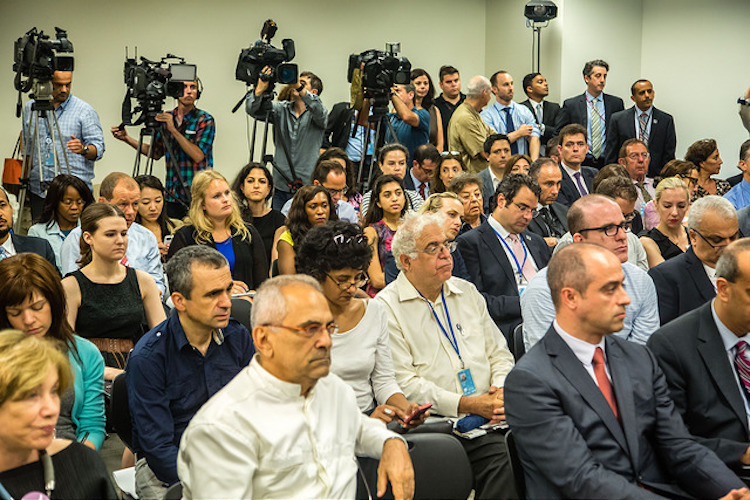By Shanta Roy
UNITED NATIONS (IDN) – The day-to-day news coverage by the UN press corps represents a virtual political barometer of the outside world – from a UN perspective.
Since most news organizations in the developing world cannot afford either a fulltime or a part-time correspondent at the UN, they have traditionally relied on the mainstream wire services and news organizations such as Reuters, BBC, the Associated Press, Deutsche Welle, Agence France-Presse (AFP) and the Chinese news agency Xinhua — all of them fully staffed and geared for extensive UN coverage.
The notable absentees include the Antara News Agency (Indonesia), the Bernama News Agency (Malaysia), the Nigerian News Agency, Afghan Islamic Press, Bhutan News Service, the Angola Press News Agency and the Philippines News Agency.
But one new development in the UN’s international press corps, currently numbering over 300 correspondents, is the increasingly large number of fulltime and part-time reporters from the Arab world and North Africa -– compared to years gone by when their presence was just marginal.
The Midddle East/North Africa news organisations currently represented at the UN include Al Jazeera, Al-Araby al-Jadeed, An-Nahar, Al Arabiya, Al-hayat, NTV, Lebanon, Al-Ahram, Al-Akhbar, Almayadeen, Kuwait Television, Al-Quds Al-Arabi, Al-Hurra, Kuwait News Agency (KUNA), Jordan News Agency, Rudaw Media Network, Emirates News Agency and Maghreb Arab Press, among others.
In contrast, there are relatively few correspondents from South Asia, South-east Asia or Latin America covering the UN now.
Asked about the discrepancy, Erol Avdovic, a longtime UN and U.S. correspondent for the Balkan Media and Managing Editor for webpublicapress told IDN: “The fact that we have much more Arab correspondents at the UN has to do with two realities: One – the Arab world is seemingly in permanent turmoil, and two, we have a large number of political issues from that part of the world at the UN in general – and specifically on the UN Security Council agenda.”
These, he said, range from the longstanding unresolved question of Palestine and the seven-year-old Syrian war to the current military conflict in Yemen, described as the world’s worst humanitarian disaster. All three issues warrant daily coverage.
“At the UN,” he said, “we face those issues almost on a daily basis – and so is the current crisis in Myanmar resulting in a mass exodus of Muslim Rohingya minorities ensuing in massive human rights violations described as ‘ethnic cleansing’ by the United Nations. Additionally, we have the ongoing North Korean nuclear saga.”
“But we don’t have the kind of simmering political and military hot spots in South and South-East Asia – as we have in the Arab world,” said Avdovic, a former president of the UN Correspondents’ Association (UNCA).
On the other hand, and more from a practical point of view, he pointed out, Arab countries are mostly oil-rich, and are able to finance their fulltime or special correspondents based in one of the most expensive cities in the world.
So, the fact is that Al-Jazeera, Al-Arabia, Al-Hayat etc. are all media outlets that are heftily financed by oil-rich Gulf States. Obviously they have plenty of money to pay their UN correspondents.
And just for comparison, he said, “I remember during the Balkan wars in Bosnia and Croatia (1991-1995), and later in Kosovo (1999), there were a dozen correspondents from Balkan states.”
And they worked both for their own domestic media outlets (that were not paying them very well and certainly not by New York standards), and also free-lanced for other media organizations such as the Voice of America, Radio Free Europe, BBC or Deutsche Welle (in Bosnian, Croatian and Serbian languages), being paid well from them, he noted.
“And I do have that profitable experience,” Avdovic declared. [IDN-InDepthNews – 6 November 2017]
Photo: A view of the press conference at the UN in New York. Source: UNCA
IDN is the flagship agency of the International Press Syndicate
Facebook.com/IDN.GoingDeeper – twitter.com/InDepthNews

